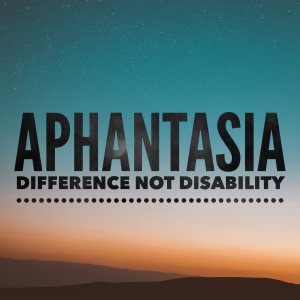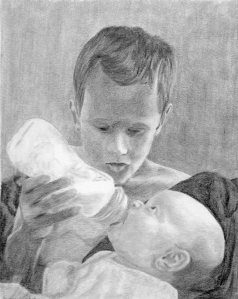Please, if someone you care about sent you this link, especially if they’ve recently discovered they have aphantasia, take the time to read the post. They’re really hoping to help you understand things about them that don’t seem to make sense.
First, if what they’re telling you about having no visual imagination or memories sounds absurd, I assure you it’s not. Only a year or so back, I discovered that most of you are speaking literally when you say, “Ok, close your eyes and imagine.” My mind was blown!
There is actually a scale that ranges from hyperphantasia, which includes those of you who can not only see visual images in your minds but have the equivalent of HD TV in there, through total aphantasia, which is where I land; I close my eyes and I see black. Literally “nothing to see here.” That scale covers a wide range of diversity with each of us often having slightly different characteristics from the next person.
Second, if your friend, loved one, or employee has only recently discovered they have aphantasia, be aware that there is a good chance they are going through very real grief. I’m an active member of Aphantasia Support Group on Facebook and we seem to gain new members every day who have only just discovered what they see as a formerly unknown disability, and they’re devastated. I can’t even offer you an example of something equivalent to help you comprehend, but it can be world-rocking to realize you lack something that almost every other person you know has had all their lives, and it’s even harder to deal with the “loss” when those people can’t even imagine your reality.
So, aphantasia. I, as an example, have absolutely no visual memory or imagination. This is not a case of failing to train my imagination (Yes, I’ve been accused of that). In fact, I have an almost hyperactive imagination, which means those who know me best are aware that there are certain things they can’t share with me. It’s just that I have no visuals to accompany the concepts.
And that’s the difference between you and me. You visualize and I conceptualize. I’ve explained that it’s like my brain is a computer and if I want the data to be available to me later I have to actively input the information and remember to hit save. But that’s all it is – information. For instance, people.
I see my sister and recognize her instantly because I’ve known her forever. Ask me to describe her, though, and… Well, she’s probably about 5′ 6″ maybe 5′ 7″? She has long, dark brown hair. Huh. I literally can’t even tell you what color her eyes are. The concept of her appearance that is in my head has no real visual cues to help me out. This has led me to hurt friends’ feelings on occasion; if you change your hair color, I will likely never even realize it. I have learned to compensate to an extent by paying attention to what others say to you. Compensating is something aphants are good at.
Learning about my aphantasia made me feel worlds better about an incident that happened about 18 years ago. Two co-coworkers were taking photos of a baby, and I asked whose baby it was. They stared at me in shock, and one said, “He’s your grandson!” I was crushed that I’d failed to recognize my own grandson, but in truth most babies look alike to me until I’ve spent a whole lot of time with them. They grow so fast that, without a working visual record, the data in my brain can’t anticipate those changes to enable recognition.
So, if you get frustrated with your aphant because they can literally spend ten minutes talking to someone only to walk away and then be unable to point the person out to you, this is why. It’s not that we’re unobservant by nature; it’s that we have to be consciously observant and try really hard to remember to add the data into our memory banks: yellow jacket; short blond hair, etc. Personally, I work so hard on the conversations that the visual notes don’t always stick.
The same principle holds true for when we’ve been places with you. Unless the place makes a real impact, those of us on my end of the spectrum may have a hard time recognizing it at first when we go back. If you say, “Meet me at the blue sign,” for instance, I’ll probably ask, “Where’s the blue sign, exactly?”
There are so many areas in which we differ from you that this could go on forever. The idea is just to help you understand that there is a difference so you can be watching for it. In truth, learning about aphantasia made me feel better about many things, like not recognizing my own grandson. Like art and design!
In the past, because I could draw, I was called an artist. I’m not and never have been, and have explained many times that no, I’m a copyist – or I was at one time. I could take a photo, put it by my drawing board, and move my gaze back and forth between the two until I’d copied the picture and ended up with something like this.
I could not compose. I could not work from memory. I could not change anything (which resulted in one drawing that I hope never again sees the light of day), because I could not envision what I wanted to create. If I didn’t see it, it couldn’t exist.
This ended up being a trigger for serious self-doubt and pain at work. I was given a task that included designing artwork on a regular basis. I did it, but every piece took me forever because I just have to guess and play with things until I stumble across something that works. I do still design some pieces, out of necessity, but it takes me much longer than it would anyone else. Could I learn design? Probably, but it would require going to a professional for training, and adapting what they teach to work with my non-visual imagination.
So, if you’re an employer with an aphant, bear in mind that, if they don’t have the training they need to do the job without visualization, you may be asking for more than they can deliver.
I’ve made it sound like aphantasia really is a disability, and to be honest some aphants definitely feel that it is. I honestly don’t see it that way, but only as a difference. I have enough going on in my head with my constant monologue; I can’t imagine also having to deal with pictures that won’t go away. I still love to read, even without being able to see the movie so many have told me they enjoy. (Truly, that is incomprehensible to me.) I don’t watch movies much, even of books I’ve read, but I’m thinking aphantasia helps me with that too because I have no preconceived ideas of what characters will look like. As it is, I skim over most descriptions in books because visual cues are meaningless to me anyway.
I am genuinely happy that I lack many of the visual memories I can’t imagine living with. Watching my stepfather drown? Conceptually and emotionally, I remember it; I am VERY glad there are no visuals to accompany those concepts. I have a feeling that may also be part of why I never suffered from PTSD as a result of that accident.
Do I have any regrets now that I know what I’m missing? Honestly, I can only think of one. I wish I could remember my loved ones’ faces. I’ve always kept photos around because that is all I have to help me remember. Knowing the rest of you have those visual memories available all the time? Yeah, that one hurts. So, side note, probably one of the best gifts you could give your aphant friend or loved one is a digital picture frame loaded with photos of those they care about.
Overall, though, I find the tradeoffs fair now that I understand why I am the way I am. God made me this way and I am happy with me. Hopefully your aphant will reach the point where they are happy with themselves too.
Celebrating Jesus!
Tammy C
For more information on aphantasia…
Aphantasia Network
Aphantasia Newbie Guide

